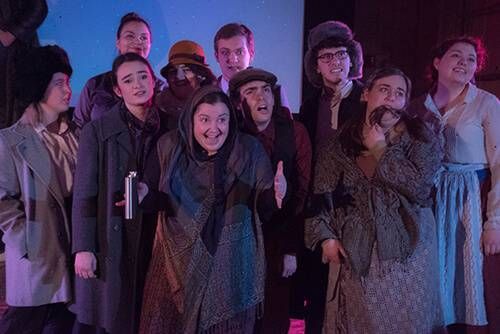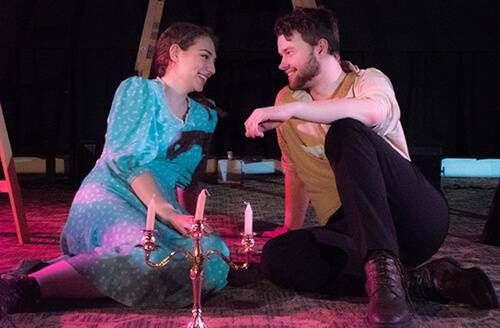Curtain Up on One Man's Second Act
At 61, he just saw his first musical draw standing ovations
Last year, as I was nearing my 60 birthday and wrote in a Next Avenue article that my first musical, The Road of Life, “has taken on a life of its own,” I had no idea how prophetic that sentence would turn out to be. Let me tell you the amazing story of what has happened with the show, and my second act, since then. (My initial career was as an editor; I'm still an editorial consultant.)
By way of background, The Road of Life is a love story set in Russia during the siege of Leningrad — the deadliest blockade in human history — and revolves around a young female poet, the Russian soldier who loves her and a Nazi lieutenant on a secret mission. It’s about how hope can survive against impossible odds. Soon after the Next Avenue piece appeared in January 2015, I received a call from Jordan Gross, president of the Musical Theatre Society (MTS) of Emerson College in Boston. Based on the favorable words of an Emerson student familiar with the project, Jordan said he wanted to produce the show as MTS’s annual New Work musical in February 2016.
So when Jay Jacques (the show’s composer and co-author) and I (the lyricist and co-author) met with Jordan in a noisy Boston café in March 2015, we were excited — and more than a little nervous. After two years of writing and rewriting, the baby we had been carefully nurturing was going to receive its first full production. Was it ready? Were we ready?
From Page to Stage
Not long after our meeting with Jordan, The Road of Life continued taking on a life of its own as the process began transferring it from the page to the stage. By summer 2015, we had a director on board: 19-year-old Rachel Salzman. Rachel, who also became the musical’s fearless advocate, decided that before the show went into production, she wanted to do a staged reading so Jay and I could see what we had. That meant the actors would perform it with scripts in hand, incorporating movement to give us a sense of how the dialogue and action would sound and look.

A few weeks before that, the cast had a preliminary “table read,” sitting in a wide circle and reading the script aloud for the first time. This provided us with our first discovery — or perhaps I should say shock — our musical clocked in at a cringe-inducing four hours. Major surgery was immediately required. We set to work pruning songs and overhauling a script that had seemed stage-ready to us just a month before. I learned an important lesson: You can’t judge a musical by what’s on the page, you only know what you’ve got when it’s being performed.
Putting It Together (After Taking It Apart)
So, it was with a lot of anticipation that I attended the staged reading of the show last fall. As I sat with Jay in one of Emerson’s rehearsal studios and saw a young cast breathe life into the musical, I was both heartened and concerned. The reading taught us that there were wonderful moments in the musical, but it didn’t touch the heart the way it needed to do. This was a disorienting feeling — as if something I thought I knew well had suddenly become unfamiliar. That night, we realized the script needed intensive work, particularly the first act. The only thing to do was to take the entire first act apart and put it back together again. From September to December, we worked furiously, tossing around ideas, reconsidering motivations of characters and rethinking who these people were. A major change: we gave the female poet, Sveta, a more dramatic personal arc and added a compelling new song for her. In January 2016, Jay and I attended final callback auditions for the February production. We were impressed by the talent of the Emerson students and were on the same page as Rachel about who should be cast. One actor (Marie Libbin) was so impressive, we wound up putting a discarded comic song back into the show for her.

We also rethought and reworked two key songs, the first act finale (We Will Not Disappear) and the all-important title song, on the recommendation of our longtime dramaturg, Richard M. Morse. Without Richard’s insistence and cajoling, these two musical moments might not have been as big as they became. After Rachel and the cast provided valuable feedback, Jay and I then rewrote the entire second act.
By Students You’ll Be Taught
As rehearsals progressed, I was impressed by the way the actors began to inhabit their roles:
- Willow Lautenberg as Sveta turned her new song (Make a Difference) into an electric moment that made the character’s motivation clear, so the audience wanted to see her succeed.
- Philip Tice (who played Sveta’s love interest) brought humanity and heart to his last number, ultimately garnering tears at every performance.
- Josh Schussler (the Nazi lieutenant) fought to have a cut number reinstated because he felt he could make it work — and he did.
- Garrett Engle (who played Vladimir Ivanovich, the cynical and amoral “king of Leningrad’s black market”), working with Rachel, gave powerful new meaning to an incidental number for Vladimir. The song became one of the high points of the second act.
During the five weeks of rehearsals and rewriting, I was blown away by the team’s collegiality. Although I’m 61 and most of the cast and crew are in their late teens, we treated each other as equals, all bound by our slightly crazy common belief in the magic of theater. And so… When MTS presented the premiere production of The Road of Life, the musical received standing ovations for each of its three performances. All our efforts had paid off. I am grateful for the insightful input and support from my family, my extended MTS family and our longtime supporters. Our next step is finding other colleges and theater companies willing to take a chance on producing an original musical and to help us tell this story celebrating the triumph of the human spirit. We look forward to (literally and figuratively) taking The Road of Life to the next stage. Maybe I’ll see you in the audience.

